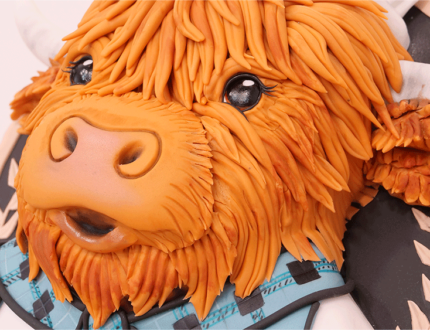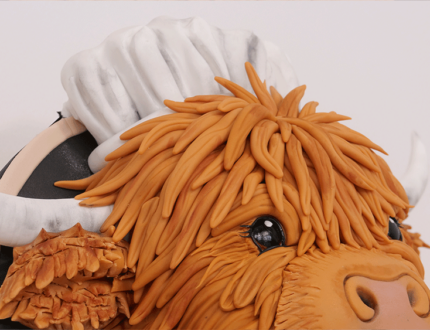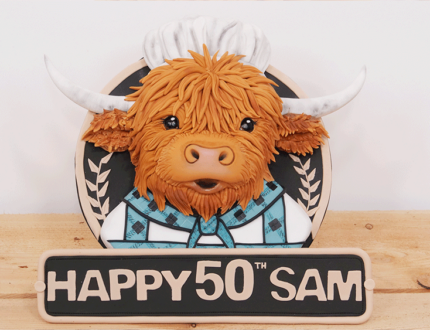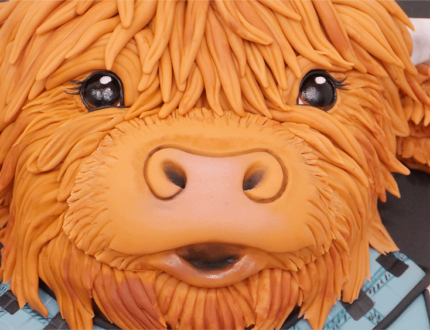Tutorial Preview
Bite Sized
Watch the whole tutorial speeded up to an edit which is less than 2 minutes !
1. Cutting out the cake
Paul starts by talking through the design then wastes no time in cutting out the shape using the template available in the templates tab.
2. Shaping and ganaching the cake
Check out how Paul makes the most of the cake available and gets the shape proportional by cutting, pushing and shaping the cake, while using the ganache as the glue to hold it all together.
3. Transferring the cake to the board
Its now time to transfer the cake over to the board. Be careful to ensure that you leave enough space for the signpost.
4. Adding the clothes
It is now time to dress our Highland Cow in baker’s clothes.
5. Adding the baker’s hat
There are a couple of options when it comes to creating the baker’s hat. Paul opted for crunched up foil paper, but alternatively you could use edible krispie treats.
6. Adding the eyes and snout
Paul now adds the facial features to start to bring the character to life.
7. Colouring the eyes and tartan pattern
Without being too detailed, Paul adds the tartan pattern onto the clothes. Of course, you can take your time and choose your tartan and create a much neater finish, but always remember the your time v reward!
8. Adding the ears
Time to give a wee Highland Cow some cute ears.
9. Adding the fur effect
This is the time consuming part. Get a movie or some music on and bring your Highland Cow to life.
10. Finishing touches
Paul now adds the signpost and with his final finishing touches there we have it! The Kilted Baker Highland Cow logo cake.
11. Other Ideas
Join Paul for some different ideas on how to use the skills learned here for future projects.
12. PRO lesson
Here our Pro members get some ideas of pricing and commercial ideas from this design.
The Kilted Baker Highland Cow cake tutorial
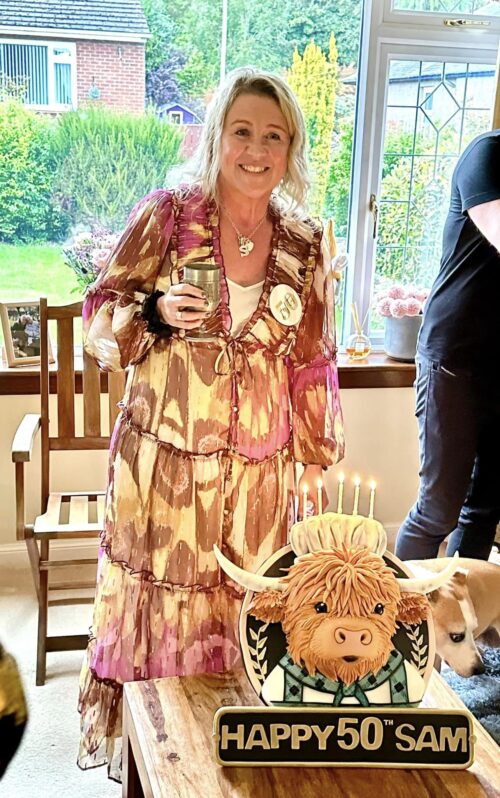 Paul Bradford is about to embark on his new business The Kilted Baker, which is set to be based in the highlands of Scotland. When considering a logo using the Highland Cow was an obvious choice given their cute and very Scottish connections. When a friend who loves Highland Cows was turning 50, creating The Kilted Baker Highland Cow cake tutorial was too big an opportunity to miss.
Paul Bradford is about to embark on his new business The Kilted Baker, which is set to be based in the highlands of Scotland. When considering a logo using the Highland Cow was an obvious choice given their cute and very Scottish connections. When a friend who loves Highland Cows was turning 50, creating The Kilted Baker Highland Cow cake tutorial was too big an opportunity to miss.
As you can see from the pic to the right that the birthday girl was delighted, but what you can’t see were the 4 bagpipe players and drummer who help create such an amazing occasion.
In the following tutorial, you will learn how to…
- Create an easy template for the head
- Make a 2D upright display stand
- Sculpt the cow’s face and add the hair
- Make firm edible horns
- Create an edible tartan pattern
- Paint and dust for the magical finishing touches
Scottish Highland Cows for The Kilted Baker
Scottish Highland cows are a breed of cattle known for their distinctive long horns and shaggy coats. They are native to the Scottish Highlands and are well-adapted to the region’s harsh climate.
Characteristics
- Long, curved horns that can grow to be over 3 feet (0.9 m) long
- Shaggy, double-layered coat that can be black, brown, red, or dun
- Thick, woolly undercoat that insulates them in cold weather
- Long, flowing tail that helps to keep them warm
- Docile and gentle temperament
History
The Scottish Highland cow is an ancient breed, with evidence of its existence dating back to the 6th century AD. They were originally used for meat and milk, but today they are primarily raised for beef.
Conservation
The Scottish Highland cow is a threatened breed, with only around 5,000 animals left in the world. Conservation efforts are underway to protect the breed and ensure its future survival.
Interesting Facts
- Scottish Highland cows are social animals and live in herds.
- They are very hardy animals and can withstand extreme weather conditions.
- Scottish Highland cows are known for their long lifespans, with some animals living to be over 20 years old.
- The shaggy coat of the Scottish Highland cow helps to protect it from insects and parasites.
- Scottish Highland cows are popular tourist attractions in Scotland.
Don’t forget to share your interpretations of this wonderful cake with Paul and the rest of the CakeFlix community on our Facebook group.
View hundreds of more world-class tutorials only at www.cakeflix.com.
